In May 1957, a handful of students gathered in a first-floor studio in Old Cabell Hall for the first broadcast on 91.3 FM. In just a few short minutes, classical music filled the airwaves, radiating out to a small audience in Charlottesville that would grow into a dedicated following.
The University of Virginia had made it to FM radio.
The station – named WTJU, for “Thomas Jefferson’s University” – was UVA’s first FM station and just the second in Charlottesville, where most cars still had only AM radios. Today, as the entire University celebrates its bicentennial, WTJU is celebrating its 60th anniversary and looking back on its beginnings in Old Cabell Hall.
“WTJU started as a non-commercial broadcasting outlet, run almost entirely by students and broadcasting mostly classical music,” current station manager Nathan Moore said.
Though WTJU’s first FM signal was weak – Moore said it would have been hard to pick up even in downtown Charlottesville – the roughly 20 UVA students on that inaugural staff had big ambitions for their slice of the airwaves.
They interspersed classical music with interviews with professors and news broadcasts shared from WUVA, the closed-circuit AM station based at the University. Early records reveal programs like The World’s Great Literature, where prose and poetry was read aloud; or a Today’s Lecture series sharing recorded lectures from the University’s classrooms. One of WTJU’s most popular programs was an annual exam marathon, which provided a classical soundtrack for long hours of studying.
The Early Years
The station broadcast from 6 p.m. to 11:30 p.m. on weekday nights through a 10-watt transmitter located in the attic of Old Cabell Hall and connected to a stub antenna on the roof. Rod Collins, the graduate student who led WTJU with the support from the then-Department of Speech and Drama acquired most of the station’s records himself, either by requesting donations from record companies or purchasing albums on his own.
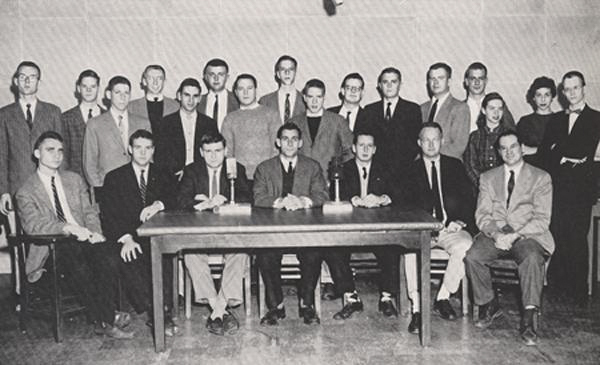
The 1958 WTJU staff. Rey Berry is seated third from the right. (Photo courtesy of WTJU)
“Rod was a genius at getting records,” alumnus Rey Berry said in an interview this summer with WTJU.
Berry, who went on to a career in radio and newspaper reporting and still lives in Charlottesville, was among the student announcers who helped establish and lead WTJU in 1957. He first adopted “Rey Berry” as a stage name on air – his legal name is Barry Plotnick – but he continued to use it in both his professional and personal life.
Berry often worked the late shift, playing classical records that Collins had selected and sharing the jacket material that provided context for each piece.
“It was a delight to go in there and work with his playlists,” Berry recalled. He said Collins, who died in 1989, displayed an incredibly vast and global knowledge of classical music. “We played a lot of stuff that was very unfamiliar to American audiences.”
Ready to Rock
As the station’s audience continued to grow, the station’s playlists – and the styles of music it broadcast – continued to broaden. By 1960, WTJU had moved from Old Cabell to the basement of the Humphreys dormitory, and student DJs were exploring their interests in genres like rock, jazz and folk, as well as classical.
“The station attracted people who had a deep interest in and knowledge of some area and wanted to share it,” Berry said.
By 1970, as women were being fully admitted to the University, the broadcasting schedule increased to 12 to 18 hours on weekdays, and rock, jazz and folk played a prominent role in WTJU’s programming – a role that has never diminished.
“Even now, 47 years later, those are the genres that we have at the core of our programming schedule,” Moore said.
Marcia Doran, who joined the station as a first-year student in 1974, was among the first women on WTJU’s staff. She oversaw its rock music programming and became the first female program director overseeing the station’s operations.
“I kept bringing more women on board – not just because they were women, but because they knew the music,” said Doran, a 1978 graduate who now works as a senior manager at NASA’s Goddard Space Flight Center. “I love the innovative, experimental, free-spirited nature of the station, then and now. Everyone encouraged you to explore all different types of music, and for me, it was just exhilarating.”
She recalled being on the air at seminal moments in history, such as the assassination of John Lennon in 1980.
“We went on the air, played Beatles music and fielded phone calls from heartbroken people,” Doran said.
“A Quiet Treasure”
It is that combination of music discovery and local community-building that makes WTJU so important to its staff, its listeners and the University, said Doran, who has remained very involved with the station and currently serves on its advisory board.
“We play an incredibly diverse selection of music and get involved with the community as well as the University. There is a whole universe of exploration going on,” she said. “To me, WTJU is a quiet treasure, yet one of the biggest treasures the University has.”
WTJU continued to evolve in the decades after Doran’s time as a student, expanding to a 24/7 broadcast schedule, adding more community DJs to work alongside students, switching its radio frequency from 91.3 to 91.1 FM, and eventually moving to its current studios in Lambeth Commons.
The station also brought in professional managers like Moore to help students coordinate with the FCC and to recruit and direct community DJs.
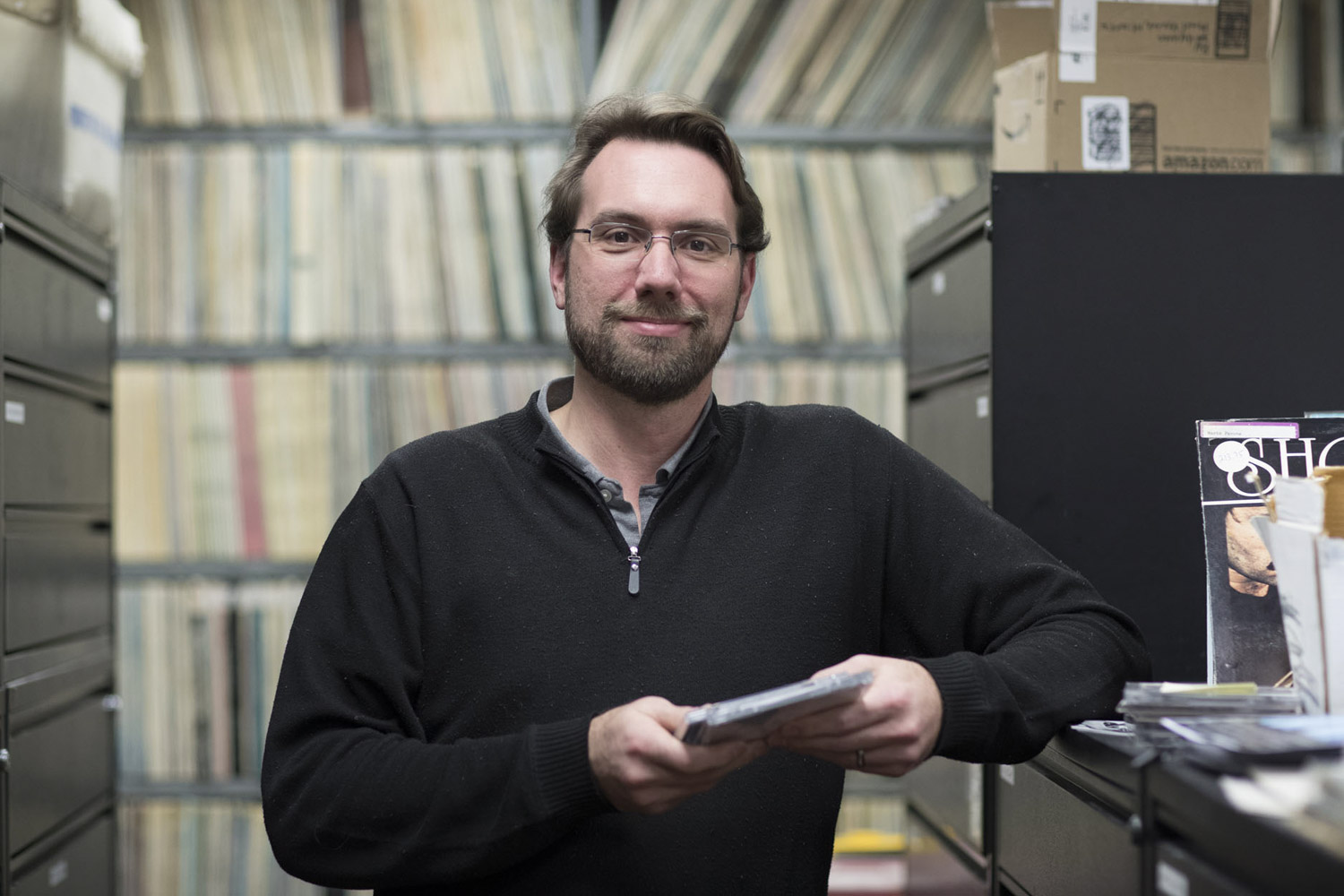
Nathan Moore became WTJU’s station manager in 2011. (Photo by Dan Addison, University Communications)
In 2013, Moore launched a second, entirely student-run affiliate station, WXTJ, to provide even more opportunities for student DJs and give students more leadership opportunities. WXTJ airs 18 hours per day online and on 100.1 FM. Both stations are non-commercial, funded by a combination of private donations, grants and University support.
Currently, WTJU and WXTJ have some 300 volunteer student and community radio hosts who play more than 1,100 unique songs per week – far more than the 100 songs played on the average commercial Top 40 station. WTJU, which reaches more than 13,000 listeners per week as far away as Staunton and Culpeper, also hosts numerous music and educational events for the UVA and Charlottesville communities. These include live in-studio concerts, film screenings, youth radio camps and a free outdoor concert series at Charlottesville’s IX Art Park.
Meet the DJs
The DJs themselves are as eclectic as the music they play, including numerous community DJs who work alongside students.
Retired middle school principal and UVA alumnus Dave Rogers, known on-air as “Professor Bebop,” has broadcast every week for 45 years, using his signature jive-talking style to share two hours of rhythm and blues.
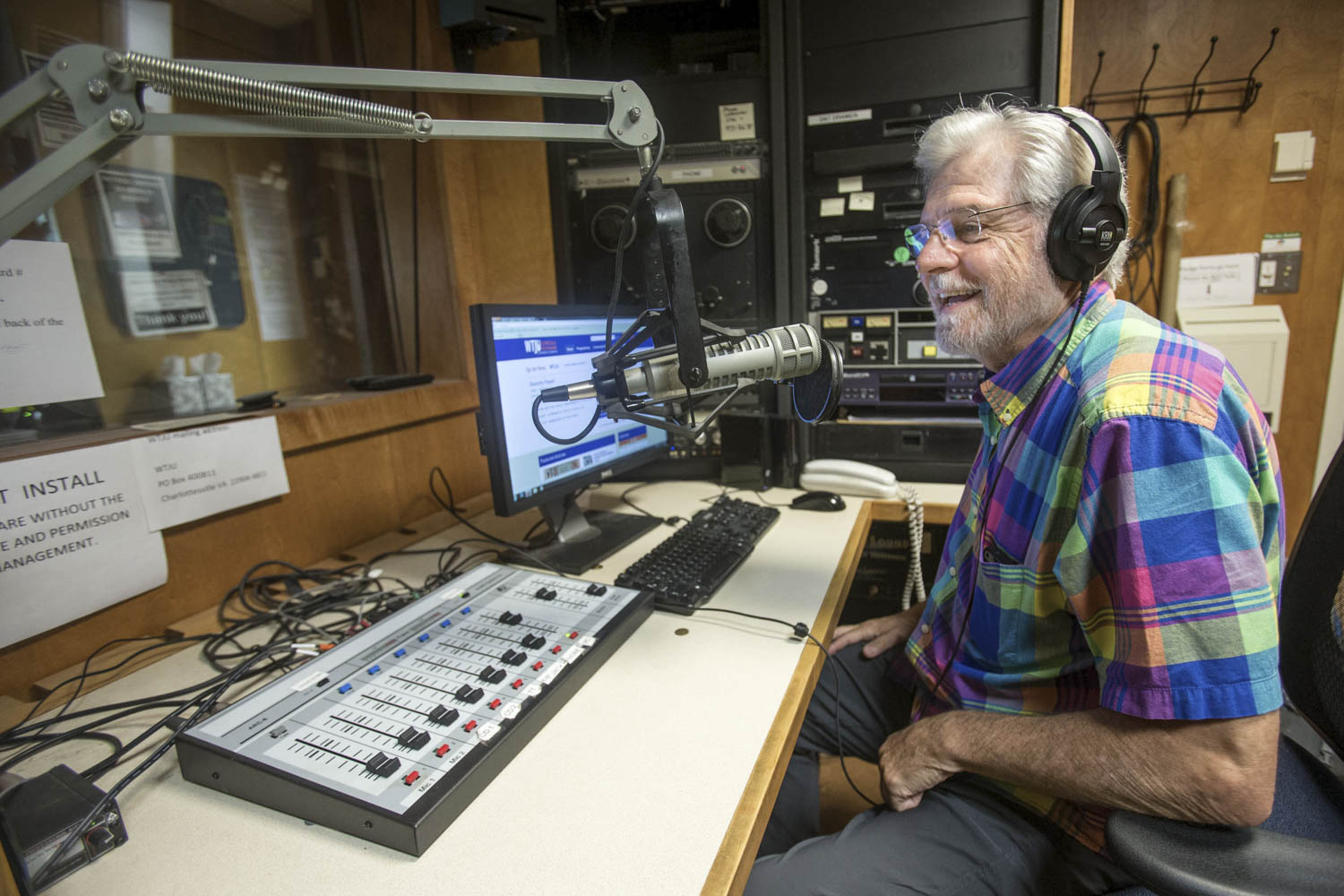
Dave Rogers – beloved on air as “Professor Bebop” – has gone on air every week for 45 years. (Photo by Sanjay Suchak, University Communications)
“All of us at the radio station are not just playing a format. We want to really lay something out there that people can hear and wonder about,” he said. “As a student at UVA, I was exposed to a lot of things, in classes and in the community, that were really eye-opening and exciting. That is what we are all about at WTJU, and what I am all about.”
Moore also brings in guest DJs to share new music and learn more about how other cities and countries utilize community radio.
In September, WTJU welcomed Kwesi Ghartey-Tagoe to share stories from his own community station, Radio Peace in Charlottesville’s sister city of Winneba, Ghana.
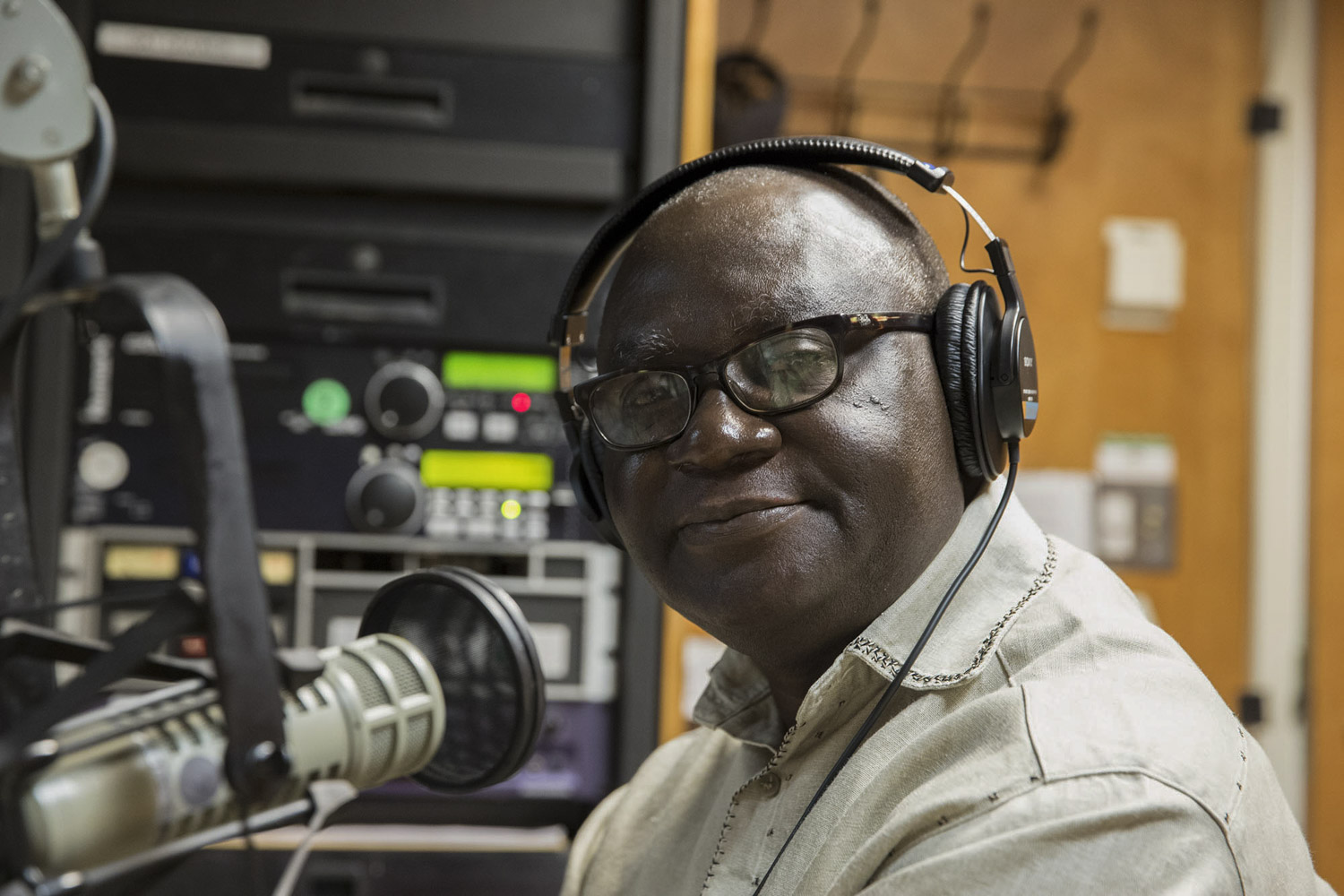
Kwesi Ghartey-Tagoe manages Radio Peace in Winneba, Ghana and visited WTJU this year to talk about how they use community radio as a tool for social and economic development. (Photo by Dan Addison, University Communications)
Radio Peace works with UNICEF to sponsor community engagement sessions where Ghanaians share concerns with government officials and work together to brainstorm solutions, work that Moore called “inspiring.”
“I wanted our volunteers and UVA students to hear about that firsthand,” Moore said.
And of course, there are the student DJs.
The current generation of student hosts is just as energetic and committed as the original group in 1957, and they say they love the community that the station creates just as much as they admire the music it shares.
“WTJU and WXTJ is a place [where] people who are musical or artistic, or who just love talking about music, can come together. We pride ourselves on being open to anyone,” said third-year student and WXTJ co-director Chase Browning. “We all have this one thing that draws us in – we love music – but everyone has different strengths. It’s wonderful to see people with different strengths get together and make something even greater.”
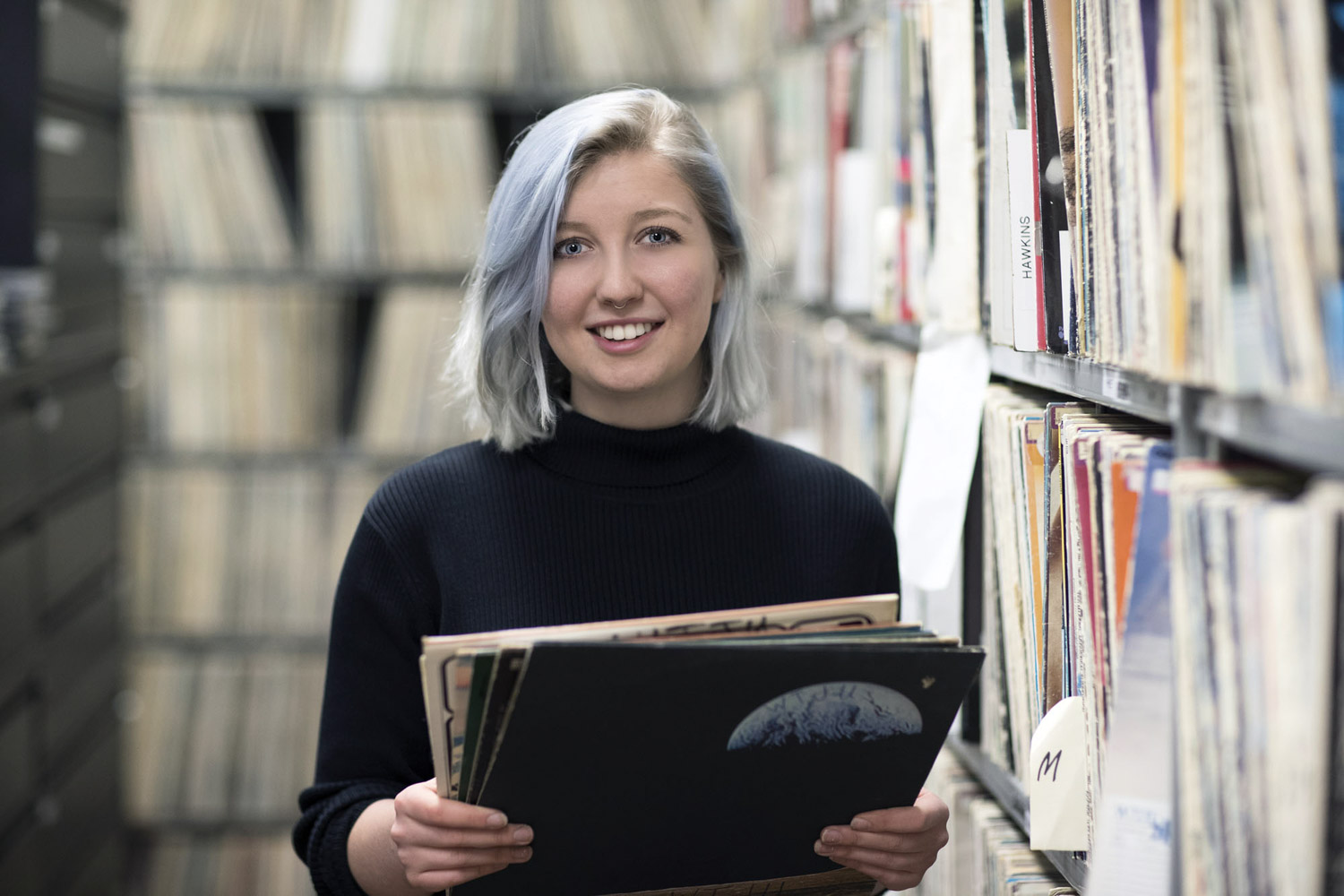
Fourth-year student Kirsten Hemrich is a co-director of WXTJ, along with third-year student Chase Browning. (Photo by Dan Addison, University Communications)
Fellow co-director Kirsten Hemrich, a studio art and poetry student, said she thrives off the creativity of her fellow student DJs. In addition to working in the studio, Hemrich often plans concerts and community events for WXTJ, pulling in both student and local artists.
“I really love WXTJ and the entire radio community here,” she said. “I love how creative all of our DJs are, how our concerts and art shows pull together a lot of talent.”
A Training Ground
The station helps students gain on-the-ground experience that will be an asset in any job they pursue. Browning and Hemrich work together to make WXTJ’s production schedule each week, recruit and select new student DJs and make sure everyone is on task – all in addition to running their own radio shows.
“I have learned a lot about what it takes to be responsible, with Kirsten, for a large group of people, and to do even just the simple things that need to get done,” said Browning, who hopes to pursue a career in radio or broadcasting. “I’m also a lot more comfortable speaking in front of crowds after being on air, which is kind of ironic, because you are just talking to a microphone in the studio.”
That on-the-job experience, Moore said, is a key component of what makes college radio so vital. Many of the station’s alumni have gone on to careers in broadcasting, entertainment or media, and many more have used their public speaking and management skills in a wide variety of industries.
“There are a lot of important roles that any college radio station can and should play,” Moore said. “One is offering a tremendous experience for students, creating a space for them to operate a real broadcast organization and gain experience speaking and presenting, and providing them with a creative community in which they can flourish.”
Second, Moore said, a college radio station can help forge closer ties between universities and surrounding communities. “At UVA, WTJU and WXTJ really extend the University’s mission beyond Grounds to enrich the culture of Virginia as a whole and bring people together with shared music experiences.”
Taken together, the two stations provide the soundtrack for the University community, from the classical music that enlivened study sessions in 1958 all the way through jazz, rock ’n’ roll, hip-hop and whatever comes over the airways next.
LOOK BACK THROUGH DECADES OF FM RADIO AT UVA
Caroline Newman
University News Associate
Office of University Communications
Original Publication: UVA Today






















